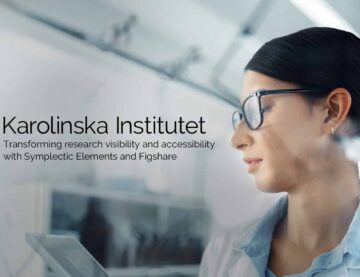ChemRxiv™ Beta Open For Submissions and Powered by Figshare
ChemRxiv™ Beta open for submissions and powered by Figshare
WASHINGTON, Aug. 14, 2017 — ChemRxiv, a new chemistry preprint server for the global chemistry community, is now available in a fully functioning Beta version for use and feedback by researchers. The Beta launch has been undertaken with initial strategic input from the American Chemical Society (ACS), Royal Society of Chemistry, German Chemical Society and other not-for profit organizations, as well as other scientific publishers and preprint services. The free-of-charge service, originally announced late last year, is managed on behalf of the chemical science community by ACS and is powered by Figshare, an online digital repository for academic research. Harnessing Figshare’s new preprint capabilities, ChemRxiv will facilitate the rapid and open dissemination of important scientific findings.
Following in the footsteps of arXiv and bioRxiv, preprint servers focused on physics and life sciences, respectively, ChemRxiv will enable researchers working across a broad range of chemistry fields to share early results with their colleagues ahead of formal peer review and publication.
“We have seen the value that preprints can make in accelerating the pace of discovery,” says James Milne, Ph.D., senior vice president, Journals Publishing Group, ACS Publications Division. “With their commitment to open data, Figshare shares our goal of supporting the sharing and dissemination of research findings in a wide variety of file formats, allowing us to meet the Society’s key mission, as well as that of ChemRxiv.”
The preprint server includes a one-page streamlined submission portal with drag-and-drop file functionality through which authors can quickly, easily and directly submit preprints in a wide variety of file formats. ChemRxiv does not have submission or access fees. All content is accessible to interested users and also for harvesting through an open API or via OAI-PMH. ChemRxiv is developing a triage process that includes plagiarism and other checks with the goal of posting preprints within one to two business days. To better enable rapid handling, the preprint server features a “next-generation curation module” that allows multiple curators to work together on large volumes of submissions.
ChemRxiv will help to accurately attribute preprints through automatic assignments of digital object identifiers (DOI) and citation tracking, and will leverage CrossRef processes to establish links between the final published version of articles and preprints. Altmetric will track online mentions with each page displaying the associated Altmetric badge and attention score.
Milne adds, “We are currently finalizing the community-wide governance supporting ChemRxiv and look forward to announcing more developments shortly. We encourage feedback from users during the weeks ahead. Direct feedback should be sent to Darla Henderson, Ph.D., assistant director, Open Access Programs, at d_henderson@acs.org.”
Emma Wilson, Ph.D., director of Publishing for the Royal Society of Chemistry, says, “Serving the chemical science community by enabling them to effectively share scientific knowledge has been central to our learned society purpose throughout our 176-year history. Our shared priority is to provide the global chemistry community with the 21st century tools they need to share and discover research.”
“Scientific publishing is changing; transparency and completion of the communication cycle are important to scientists, publishers and funders,” says Mark Hahnel, CEO of Figshare. “In fast-paced fields like chemistry, moving to facilitate broad dissemination of ideas earlier in the process will speed up science. The intent behind ChemRxiv is to give the global chemistry community a central place to share and build recognition for their research discoveries — positively shaping routes of future work. Working with the ChemRxiv community-driven team to make this a reality is a distinct honor.”
ChemRxiv is set to continue to release updates to functionality and features throughout 2017 and 2018. To learn more about ChemRxiv, visit www.chemrxiv.org.
About Figshare
Figshare is a web-based platform to help academic institutions manage, disseminate and measure the public attention of all their research outputs. The light-touch and user-friendly approach focuses on four key areas: research data management, reporting and statistics, research data dissemination and administrative control. Figshare works with institutions in North America and internationally to help them meet key funder recommendations and to provide world-leading tools to support an open culture of data sharing and collaboration. For more information, visit http://figshare.com, and follow @figshare on Twitter.
About Digital Science
Digital Science is a technology company serving the needs of scientific and research communities at key points along the full cycle of research. It invests in and incubates research software companies that simplify the research cycle, making more time for discovery. Its portfolio companies include a host of leading brands including Altmetric, BioRAFT, Figshare, IFI CLAIMS, Labguru, Overleaf, ReadCube, Symplectic, ÜberResearch, Peerwith, GRID, TetraScience and Transcriptic. It is operated by global media company the Holtzbrinck Publishing Group. Visit https://www.digital-science.com, and follow @digitalsci on Twitter.
About the American Chemical Society
The American Chemical Society, the world’s largest scientific society, is a not-for-profit organization chartered by the U.S. Congress. ACS is a global leader in providing access to chemistry-related information and research through its multiple databases, peer-reviewed journals and scientific conferences. ACS does not conduct research, but publishes and publicizes peer-reviewed scientific studies. Through its Publications Division, the Society publishes 50+ peer-reviewed journals and eBooks. ACS journals are among the most cited, most trusted and most read within the scientific literature. The Publications Division offers high-quality service to authors and readers, including rapid time to publication, cutting-edge web and mobile delivery platforms and comprehensive open-access options. The Society’s main offices are in Washington, D.C., and Columbus, Ohio.
About the Royal Society of Chemistry
We advance excellence in the chemical sciences. With over 50,000 members and a knowledge business that spans the globe, we are the UK’s professional body for chemical scientists; a not-for-profit organisation with 175 years of history and an international vision for the future. We promote, support and celebrate chemistry. We work to shape the future of the chemical sciences — for the benefit of science and humanity.
About the German Chemical Society
The Gesellschaft Deutscher Chemiker (GDCh) is the largest chemical society in continental Europe with members from academe, education, industry and other areas. The GDCh supports chemistry in teaching, research and application and promotes the understanding of chemistry in the public. In 2017 the GDCh celebrates the 150th anniversary of the founding of its predecessor society, the Deutsche Chemische Gesellschaft.
To automatically receive press releases from the American Chemical Society, contact newsroom@acs.org. Follow them on Twitter and on Facebook



